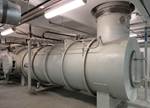Teijin introduces LCA for carbon fiber intermediate materials
Life cycle assessment (LCA) studies calculate the environmental impact of Teijin composites for future emission reduction activities.
Photo Credit: Teijin Ltd.
Teijin Ltd. (Tokyo, Japan) announces that it has adopted lifecycle assessment (LCA) to calculate the environmental footprint of its carbon fiber intermediate materials. By calculating the environmental impacts of its production processes, Teijin expects to devise ways to reduce emissions in each production process as well as to expedite collaboration with partner companies throughout its supply chain, from manufacturing to disposal, and to implement LCA initiatives for the entire lifecycles of Teijin carbon fiber products.
Teijin completed the LCA of its carbon fiber filament manufacturing processes in December 2021, based on which the company has calculated the LCA for its carbon fiber filament applications. This covers carbon fiber textiles, prepregs and short fibers for composites used in diverse applications, such as sporting goods, industrial products, aircraft, automobiles and others requiring optimized low-weight, high-strength combinations.
Teijin’s LCA studies, which have been certified by an independent third-party organization, in accordance with ISO14040 and ISO14044 standards, will reportedly provide customers with reliable emissions data regarding Teijin’s carbon fiber intermediate materials and thereby help these companies to evaluate their own environmental footprints better.
Looking ahead, Teijin expects to expand the scope of its LCA activities to other carbon fiber products, in cooperation with customers, including the makers of final products.
Related Content
-
JEC World 2024 highlights: Thermoplastic composites, CMC and novel processes
CW senior technical editor Ginger Gardiner discusses some of the developments and demonstrators shown at the industry’s largest composites exhibition and conference.
-
Plant tour: Teijin Carbon America Inc., Greenwood, S.C., U.S.
In 2018, Teijin broke ground on a facility that is reportedly the largest capacity carbon fiber line currently in existence. The line has been fully functional for nearly two years and has plenty of room for expansion.
-
Plant tour: Airbus, Illescas, Spain
Airbus’ Illescas facility, featuring highly automated composites processes for the A350 lower wing cover and one-piece Section 19 fuselage barrels, works toward production ramp-ups and next-generation aircraft.



